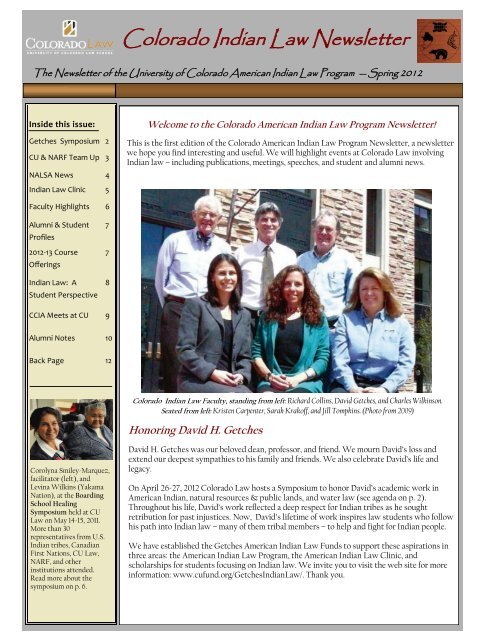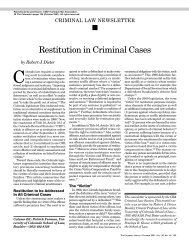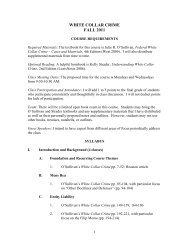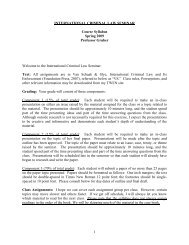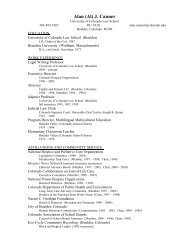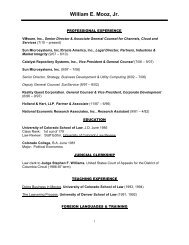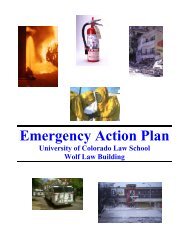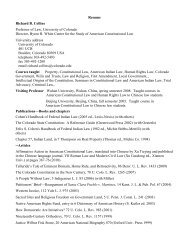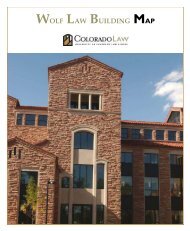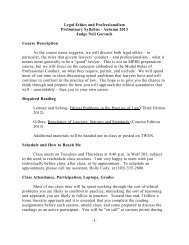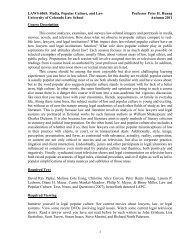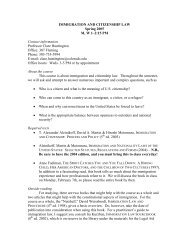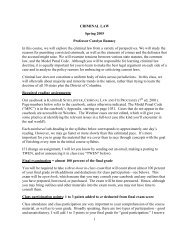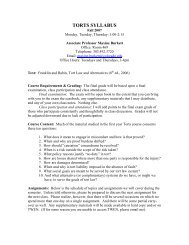Colorado Indian Law Newsletter - Colorado Law
Colorado Indian Law Newsletter - Colorado Law
Colorado Indian Law Newsletter - Colorado Law
Create successful ePaper yourself
Turn your PDF publications into a flip-book with our unique Google optimized e-Paper software.
<strong>Colorado</strong> <strong>Indian</strong> <strong>Law</strong> <strong>Newsletter</strong>The <strong>Newsletter</strong> of the University of <strong>Colorado</strong> American <strong>Indian</strong> <strong>Law</strong> Program — Spring 2012Inside this issue:Getches Symposium 2CU & NARF Team Up 3NALSA News 4<strong>Indian</strong> <strong>Law</strong> Clinic 5Welcome to the <strong>Colorado</strong> American <strong>Indian</strong> <strong>Law</strong> Program <strong>Newsletter</strong>!This is the first edition of the <strong>Colorado</strong> American <strong>Indian</strong> <strong>Law</strong> Program <strong>Newsletter</strong>, a newsletterwe hope you find interesting and useful. We will highlight events at <strong>Colorado</strong> <strong>Law</strong> involving<strong>Indian</strong> law – including publications, meetings, speeches, and student and alumni news.Faculty Highlights 6Alumni & StudentProfiles2012-13 CourseOfferings<strong>Indian</strong> <strong>Law</strong>: AStudent Perspective778CCIA Meets at CU 9Alumni Notes 10Back Page 12<strong>Colorado</strong> <strong>Indian</strong> <strong>Law</strong> Faculty, standing from left: Richard Collins, David Getches, and Charles Wilkinson.Seated from left: Kristen Carpenter, Sarah Krakoff, and Jill Tompkins. (Photo from 2009)Honoring David H. GetchesCorolyna Smiley-Marquez,facilitator (left), andLevina Wilkins (YakamaNation), at the BoardingSchool HealingSymposium held at CU<strong>Law</strong> on May 14-15, 2011.More than 30representatives from U.S.<strong>Indian</strong> tribes, CanadianFirst Nations, CU <strong>Law</strong>,NARF, and otherinstitutions attended.Read more about thesymposium on p. 6.David H. Getches was our beloved dean, professor, and friend. We mourn David’s loss andextend our deepest sympathies to his family and friends. We also celebrate David’s life andlegacy.On April 26-27, 2012 <strong>Colorado</strong> <strong>Law</strong> hosts a Symposium to honor David’s academic work inAmerican <strong>Indian</strong>, natural resources & public lands, and water law (see agenda on p. 2).Throughout his life, David’s work reflected a deep respect for <strong>Indian</strong> tribes as he soughtretribution for past injustices. Now, David’s lifetime of work inspires law students who followhis path into <strong>Indian</strong> law – many of them tribal members – to help and fight for <strong>Indian</strong> people.We have established the Getches American <strong>Indian</strong> <strong>Law</strong> Funds to support these aspirations inthree areas: the American <strong>Indian</strong> <strong>Law</strong> Program, the American <strong>Indian</strong> <strong>Law</strong> Clinic, andscholarships for students focusing on <strong>Indian</strong> law. We invite you to visit the web site for moreinformation: www.cufund.org/Getches<strong>Indian</strong><strong>Law</strong>/. Thank you.CU AILP NEWSLETTER • SPRING 2012 • www.colorado.edu/law/centers/programs/indianlaw/ 1
American <strong>Indian</strong> <strong>Law</strong> Clinic SpotlightMock Trial: Clinic Students Argue in Front of <strong>Indian</strong> Jurors in Tribal Court SettingAmerican <strong>Indian</strong> <strong>Law</strong> Clinic students, working underthe supervision of Professor Jill Tompkins, conducted amock trial on Saturday, April 7, 2012, at the Denver<strong>Indian</strong> Center in Denver.The trial, styled Rita Nightwind Francis v. Northern MoccasinTribal Nation, was based on the 1978 U.S. Supreme Courtcase, Santa Clara Pueblo v. Martinez. In Martinez, a caseargued by Prof. Richard Collins, a female full-bloodSanta Clara tribal member who married outside thetribe brought an <strong>Indian</strong> Civil Rights Act (ICRA) claimin federal court against the Santa Clara Pueblo. Thetribe refused her child enrollment as a Santa Clara tribalmember and Martinez argued that - since the tribeallowed men who married outside the tribe to enrolltheir children - she was discriminated on based on sexand her rights were violated under ICRA. The U.S.Supreme Court did not reach the merits of the case andheld in favor of the tribe based on sovereign immunityand also ruled that ICRA provided no private cause ofaction for tribal members against the tribe other thanhabeas corpus.The facts of Nightwind were similar to Martinez in that theplaintiff Nightwind challenged the tribe’s refusal to enrollher child because she did not marry a member of the sametribe. But, alternatively, in Nightwind, the trial was held intribal court on a tribal ordinance claim and the tribe waivedits sovereign immunity on such a claim, forcing a decisionon the merits.Five clinic students participated in the trial, and thewitnesses and jury were comprised of American <strong>Indian</strong>sfrom the greater-Denver community, including Rose Cunyand Ray Ramirez from NARF, Dr. Doreen Martinez, ErnestHouse, Jr., Keith Smith, and Vivian Delgado. In the end, thejury found for the plaintiff, Nightwind.Above: Jake Taufer ‘12 stands during the AILC’s Nightwindtrial. Seated from left are Travis Bruner ‘13, Beth Baldwin ‘12,Erica Rogers ‘13 (obscured) and Anne Mariah Tapp ‘12.Left: Denver/Boulder area American <strong>Indian</strong> communitymembers deliberate on the AILC’s Nightwind jury.AILC Celebrates its 20th Anniversary in 2012!This year marks the 20th Anniversary of the impressive CU American <strong>Indian</strong> <strong>Law</strong> Clinic, the oldest clinic of its kindin the country. On April 26, 2012, the AILC held a gathering at the Center for Community on the Boulder campusto celebrate the rich history of the AILC. The event took place just prior to Professor Wilkinson’s address at theGetches Symposium.The AILC has been blessed to have continually had strong leadership, including Robert Golten, Jerilyn DeCoteau,Sarah Krakoff, and now Jill Tompkins. In 2008, the AILC received the CU Diversity Service Recognition Awardpresented by the Chancellor’s Advisory Committee on Minority Affairs. Congratulations to the AILC and ProfessorTompkins for an incredible job helping native people.CU AILP NEWSLETTER • SPRING 2012 • www.colorado.edu/law/centers/programs/indianlaw/ 5
American <strong>Indian</strong> <strong>Law</strong> Faculty HighlightsNew <strong>Indian</strong> <strong>Law</strong> Books from <strong>Colorado</strong> <strong>Law</strong>Siletz Tribal HistoryProfessor Charles Wilkinson spent five years researchingand writing THE PEOPLE ARE DANCING AGAIN:THE SILETZ TRIBE OF WESTERN OREGON, the historyof the Siletz people and likelythe first tribal history everwritten with complete input ofthe tribe. Wilkinson tells thedistinct story of the ConfederatedTribes of Siletz <strong>Indian</strong>s –twenty-seven tribes speakingat least ten languages – whowere brought together on theOregon Coast through treatieswith the federal government.Later “terminated” by thefederal government, the Siletzbecame the second tribe to have itsfederal status, treaty rights, andsovereignty restored in 1977. Withseven <strong>Colorado</strong> <strong>Law</strong> students (Greggde Bie ‘05, Josh Tenneson ‘07, MariaAparacio ‘07, Carrie Covington ‘09,Alison Flint ‘09, Matt Samelson ‘11,and Daniel Cordalis ‘11) serving asresearch assistants, THE PEOPLE ARE DANCING AGAINis based on archival work and interviews with dozensof individuals.Civil Rights in <strong>Indian</strong> CountryProfessor Kristen Carpenter, along with co-editorsMatthew L.M. Fletcher and Angela R. Riley, haspublished the INDIAN CIVIL RIGHTS ACT AT 40, a newbook that examines the first fortyyears of tribal governmentresponses to the <strong>Indian</strong> CivilRights Act (ICRA). Withcontributions from leadingscholars and indigenous leaders,this collection provides a surveyand critical analysis of how<strong>Indian</strong> tribes interpret and applyICRA’s provisions on due process,equal protection, religiousfreedom, and free speech. Theeditors conclude that while informedby the dominant society'sconception of individual rights,<strong>Indian</strong> nations are ultimatelyadapting and interpreting ICRA inways consistent with their owntribal traditions and beliefs.Recent and Ongoing ProjectsTribes and Climate Change. Professor Sarah Krakoffhas been working with the NationalCongress of American <strong>Indian</strong>s (NCAI),as well as other institutions and nonprofits,to coordinate information andstrategic thinking about the impacts ofclimate change on <strong>Indian</strong> tribes. Thework began with a seed grant from CU'sRenewable and Sustainable EnergyInstitute. <strong>Colorado</strong> <strong>Law</strong> Research Fellow Julie Teelattracted additional funding to prepare climate changeadaptation and renewable energy reports for tribes in theSouthwest, and Julie Nania ‘11 is now working on theproject. Complementing the applied research for tribes,Professor Krakoff has recently published RadicalAdaptation, Justice, and American <strong>Indian</strong> Nations,4 ENVIRONMENTAL JUSTICE 207 (2011).The <strong>Indian</strong> Boarding School Legacy. In May 2011,<strong>Colorado</strong> <strong>Law</strong> hosted the American <strong>Indian</strong> BoardingSchool Healing Symposium, which drew togethersurvivors of the boarding schools, <strong>Indian</strong>law experts, tribal cultural and languageprotectors, historians, educators andmental health providers. Facilitated byProfessor Jill Tompkins and NativeAmerican Rights Fund Attorney DonWharton ‘73, the Symposium developeda nationally unified multi-dimensionalstrategy to attain a national apology for the federalboarding school policy and to effectuate healing for thesurvivors, their families and tribal communities. AILCstudent attorneys Erica Rogers ’13 and Beth Baldwin ‘12drafted legislation to establish a federal Native AmericanBoarding School Study Commission to effectuate thesymposium strategy.American <strong>Indian</strong> Religious and Cultural Freedoms.Professors Richard Collins and Kristen Carpenterrecently convened the nation’s firstacademic workshop devoted to dialoguebetween general scholars of law andreligion and specialists in American<strong>Indian</strong> cases. Co-sponsored by theIndigenous <strong>Law</strong> Center at MichiganState, the Workshop discussed cases oneagle feathers, sacred sites, and peyotecoming up through the federal courts, especially underthe Religious Freedom Restoration Act. Carpenter willpublish her workshop article, Limiting Principles andEmpowering Practices in American <strong>Indian</strong> Religious Freedoms, inthe CONNECTICUT LAW REVIEW (2012).6 AMERICAN INDIAN LAW PROGRAM AT COLORADO
Alumni and Student Profiles:Patrice H. Kunesh & Jacquelyn JampolskyPatrice Kunesh ’89Patrice H. Kunesh ‘89, Standing Rock Lakota descent, has been appointed Deputy Solicitor for<strong>Indian</strong> Affairs at the U.S. Department of the Interior, where she supervises the work of theSolicitor’s Office on a breadth of matters concerning American <strong>Indian</strong> tribes and individual <strong>Indian</strong>s,<strong>Indian</strong> lands, and <strong>Indian</strong> gaming. Before joining the Department, Patrice was a member of thefaculty of the University of South Dakota School of <strong>Law</strong> where, since 2005, she taught in the areasof Federal <strong>Indian</strong> <strong>Law</strong>, Legislation, Property <strong>Law</strong>, and Children & the <strong>Law</strong>. She also directed theUniversity’s Institute of American <strong>Indian</strong> Studies.Patrice began her legal career at the Native American Rights Fund as a Skadden Public InterestFellow and then as a Staff Attorney, where she litigated cases involving tribal sovereignty andnatural resources and provided legal and policy advice to tribes on a wide variety of <strong>Indian</strong> law and tribal governanceissues. In 1995 she became in-house counsel to the Mashantucket Pequot Tribe of Connecticut, where she continued herlegal and policy work in the areas of child welfare, development of tribal law and governance, and economicdevelopment. Patrice is a 1989 graduate of <strong>Colorado</strong> <strong>Law</strong>, where she was an editor of the COLORADO LAW REVIEW.Jacquelyn “JJ” Jampolsky ‘14, NALSA PresidentJacquelyn Jampolsky, Cherokee descent, is a third-year J.D./Ph.D. student and current president ofNALSA. Jacquelyn is a California native, raised in the Bay Area and graduated Phi Beta Kappa with aB.S. in Conservation and Resource Studies from the University of California, Berkeley in 2008.Jacquelyn was drawn to the <strong>Colorado</strong> because of its interdisciplinary offerings and strong <strong>Indian</strong> lawprogram. Her interests focus on <strong>Indian</strong> law, international law, sustainable agriculture, andindigenous rights. She is also pursuing her Ph.D. through the Environmental Studies Department asa part of the unique J.D./Ph.D. dual-degree program offered at CU. Jacquelyn competed in the 2012National NALSA moot court competition, winning first place for Best Legal Brief, and in 2011,traveled to Rio de Janeiro, Brazil, to compete in the inaugural Inter-American SustainableDevelopment <strong>Law</strong> Moot Court Competition. Jacquelyn recently won 2nd place in the AMERICANINDIAN LAW REVIEW national student writing contest for her paper entitled "Mapping Indigenous Cultural Property."In addition to working on the dual-degree program, Jacquelyn has clerked at NARF since Fall 2010, including receivingprestigious NARF summer clerkships in 2011 and 2012, and has become an important member of the NARF team.Jacquelyn is also lead notes and comment editor for the COLORADO JOURNAL OF INTERNATIONAL ENVIRONMENTAL LAW &POLICY. In her free time Jacquelyn tends to her chickens, garden, and prefers to dance whenever possible.<strong>Indian</strong> <strong>Law</strong> Course Offerings: 2012-2013Fall 2012American <strong>Indian</strong> <strong>Law</strong> I (Krakoff)American <strong>Indian</strong> <strong>Law</strong> Clinic (Tompkins)Advanced Topics in American <strong>Indian</strong> <strong>Law</strong> Seminar: Criminal& Civil Justice in <strong>Indian</strong> Country (Eid)American <strong>Indian</strong> <strong>Law</strong> Program Faculty-Kristen Carpenter-Richard Collins-Sarah Krakoff-Jill Tompkins-Charles WilkinsonAdjunct Professors: Troy Eid and Jennifer WeddleSpring 2013American <strong>Indian</strong> <strong>Law</strong> II (Wilkinson)American <strong>Indian</strong> <strong>Law</strong> Clinic (Tompkins)Advanced Topics in American <strong>Indian</strong> <strong>Law</strong> Seminar: IndigenousPeoples in International <strong>Law</strong> (Carpenter)CU AILP NEWSLETTER • SPRING 2012 • www.colorado.edu/law/centers/programs/indianlaw/ 7
Happenstance & Luck—by Anne Mariah Tapp ‘12I entered law school with no idea that I would focus mycareer on <strong>Indian</strong> law. I’m embarrassed to admit that I didn’teven know that <strong>Indian</strong> law occupied its own field. Then Ihad the good fortune to be assigned to every <strong>Indian</strong> <strong>Law</strong>teacher who teaches a first year course: Sarah Krakoff forCivil Procedure, Kristen Carpenter for Property, and RickCollins for Constitutional <strong>Law</strong>. By the time I had finished1L year, I’d learned about issues ranging from jurisdiction in<strong>Indian</strong> Country to battles over aboriginal title. By anotherstroke of luck, David Getches needed a research assistant; Ibegan working for him on <strong>Indian</strong> water law issues andfound both a great teacher and my career path. Writingthis, it’s almost funny to think how easily I could havemissed these opportunities, taken a different road.With all this as background, working with Jill Tompkins inthe AILC is such a lovely ending to my time at CU <strong>Law</strong>. It isonly at the AILC that I have begun to understand what itmeans to practice <strong>Indian</strong> law. I was assigned a variety ofcases including land transfer issues, a transfer of a guardianship,a religious freedom case, sacred site protection, and awater rights issue. Professor Tompkins assigns us a broadvariety of legal questions to give us the experience of beinga tribe’s in-house counsel. As an aside, tribal in-house counselhave my great admiration; it was not easy to get up tospeed on all these issues!My favorite cases at the AILC have been working on landbased issues, specifically water rights and sacred sites. Inboth of these areas, I have been able to see the great lengthof time involved in <strong>Indian</strong> law and the importance of place.These issues appear, either directly or impliedly, every dayin the academics of <strong>Indian</strong> law. However, speaking to tribalmembers and tribal attorneys about the history of thesedisputes is an entirely different experience.The AILC has also brought me closer to the <strong>Indian</strong> lawcommunity, both within and outside of CU <strong>Law</strong>. For instance,members of the <strong>Indian</strong> law community participatedas jurors, witnesses, and coaches for our mock trial. Theattorneys at the Native American Rights Fund visit ourclasses frequently to share their experiences and advise uson many issues. The AILC has given me the opportunity tobuild and deepen friendships with peers and mentors in the<strong>Indian</strong> <strong>Law</strong> community and that is a truly invaluable gift.This is particularly true within CU <strong>Law</strong> where I have beenable to work with many of the professors in the <strong>Indian</strong> lawprogram. Working with (and trying to keep up with) myprofessors was an unexpected bonus and it was great tohave their encouragement as I began the shift from theclassroom to practice. I never imagined that any part of lawschool would give me the community, camaraderie, and joyin my work that I experience almost every day. While I mayhave begun my career in <strong>Indian</strong> law by happenstance andluck, I made a good (and conscious choice) to end it withthe AILC.An Elder: Vine Deloria (1933-2005)Vine Deloria Jr. ’70 was born into a distinguished YanktonSioux family and was a former CU-Boulder professor, author,and influential American <strong>Indian</strong> leader. He wrote more than 20books, including God is Red; We Talk, You Listen; American<strong>Indian</strong> Policy in the Twentieth Century; Singing for a Spirit;and Custer Died for Your Sins, one of the most influentialAmerican <strong>Indian</strong> affairs books ever written. In 2002, he receivedthe Wallace Stegner Award, the highest honor presentedby the CU-Boulder Center of the American West. The inscriptionread: “Always grounded in the stories told by theplains and ridges of your Sioux homeland, and guided by yourvision of a vibrant tribal sovereignty, you have become a herofor the ages in <strong>Indian</strong> country and far beyond, you havechanged the West and the world through your activism duringthe termination crisis, your spirited leadership ever since, yourvast and influential writings, and your encompassing mind andmatchless courage.”<strong>Colorado</strong> American <strong>Indian</strong> <strong>Law</strong> ProgramFellow: Daniel CordalisDaniel Cordalis ’11, Navajo, is working as our firstAmerican <strong>Indian</strong> <strong>Law</strong> Program Fellow, a new positiondesigned to assist the school in strengthening its <strong>Indian</strong>law program. Daniel, former NALSA President andResearch Assistant for Professor Charles Wilkinson, willwork closely with faculty and the Dean’s office to increasethe presence of <strong>Colorado</strong> <strong>Law</strong> in the native community,both locally and nationally, and help attract more American<strong>Indian</strong> students to <strong>Colorado</strong> <strong>Law</strong>. Daniel is completing ajoint J.D./Ph.D. in <strong>Law</strong> and Environmental Studies and willbegin a clerkship with Justice Gregory J. Hobbs, Jr., in the<strong>Colorado</strong> Supreme Court in Fall 2012.Save the Date!U.N. Special Rapporteur on Indigenous Peoples toVisit <strong>Colorado</strong> <strong>Law</strong>In 2007, the United Nations adopted the Declaration onthe Rights of Indigenous Peoples. We will be honored tohost S. James Anaya, the U.N. Special Rapporteur onIndigenous Peoples, at <strong>Colorado</strong> <strong>Law</strong> January 23-24, 2013.Anaya will serve as our annual Thomson Visitor anddeliver a community lecture – details to follow!8 AMERICAN INDIAN LAW PROGRAM AT COLORADO
Colo. Commission of <strong>Indian</strong> Affairs Convenes at CU <strong>Law</strong><strong>Colorado</strong> <strong>Law</strong> hosted the quarterly meeting of the <strong>Colorado</strong> Commission of <strong>Indian</strong> Affairs (CCIA) onMarch 23, 2012. The statutorily-created CCIA is located in the Lt. Governor’s office and serves as theofficial liaison between the <strong>Colorado</strong> <strong>Indian</strong> tribes and the State of <strong>Colorado</strong>. The meeting broughtleaders of the two <strong>Colorado</strong> tribes, the Southern Ute and Ute Mountain Ute, Lt. Gov. Joe Garcia,CCIA Executive Secretary Ernest House Jr., and other key state officials together to discuss an arrayof topics, including health care, fishing rights, higher education, and repatriation. <strong>Colorado</strong> <strong>Law</strong>alumni including Peter Ortego ‘93, General Counsel for the Ute Mountain Ute Tribe, and MonteMills ‘03, Director of the Legal Department for the Southern Ute Tribe, participated.Dean Weiser addressed the CCIA meeting, reaffirming <strong>Colorado</strong> <strong>Law</strong>’s commitment to our <strong>Indian</strong> law program and incontinuing to educate American <strong>Indian</strong> students. “We are deeply committed to tribal law within our community,”Weiser said. “Getting students from Native American communities and <strong>Indian</strong> tribes is a priority, and so is getting themscholarships.” The Ute leaders urged Dean Weiser to remember and celebrate the tribal history of the Boulder area,perhaps formally. Weiser agreed, and offered that <strong>Colorado</strong> <strong>Law</strong> would like to work on such an important event. Lt. Gov.Garcia also asked Daniel Cordalis ‘11, <strong>Colorado</strong> <strong>Law</strong> American <strong>Indian</strong> <strong>Law</strong> Program Fellow, to speak about the <strong>Colorado</strong><strong>Indian</strong> Education Foundation’s scholarship program, which Cordalis was a recipient of, and his educational experience at<strong>Colorado</strong> <strong>Law</strong>.Above: Dean Phil Weiser (right) addresses theCCIA. Seated to Weiser’s left are Southern UteTribal Council Member Pathimi Goodtracks, Lt.Gov. Joe Garcia, and CCIA Executive Director andUte Mountain Ute tribal member Ernest House,Jr.Left: Ute Mountain Ute Tribal Council Member,and former Tribal Chairman, Manual Hartdiscusses tribal issues at the CCIA meeting.Right: Daniel Cordalis ‘11, speaks at the CCIAmeeting.Photographs courtesy of Jeremy Wade Shockley/The Southern Ute Drum.CU AILP NEWSLETTER • SPRING 2012 • www.colorado.edu/law/centers/programs/indianlaw/ 9
Alumni WhereaboutsWe are pleased to share some professional updates on members of our community, noting just how many of them are workingin American <strong>Indian</strong> <strong>Law</strong> and related fields! If we are missing your information or you’d like to send a correction or update,please get in touch with our new Director of Alumni Relations Katy Brown katy.brown@colorado.edu.Amy Alderman ‘89 lives in Mfuwe, Zambia, and works at The Bushcamp Company.Edward Halealoha Ayau ‘89 (Native Hawaiian) is an advocate, activist, and leader in the movement for Native Hawaiianrights, repatriation and the care of ancestral remains.Brad Barlett ‘98 is the managing attorney at the Energy Minerals <strong>Law</strong> Center, in Durango, CO.Joshua Breedlove ‘06 (Mississippi Band of Choctaw <strong>Indian</strong>s) is a staff attorney for his tribe.Sarah Bond ‘81 is an Assistant Attorney General in Montana, specializing in water law and <strong>Indian</strong> law.James Bransky ‘85 is an attorney for the Little Traverse Bay Band of Odawa <strong>Indian</strong>s.William Brooks ‘88 is an Tribal Attorney at the Nottawaseppi Huron Band of Potawatomi <strong>Indian</strong>sShanna Selsor Burgin ‘07, (Muscogee (Creek) Nation) is an Assistant Attorney general for her tribe in Okmulgee, OK.Melissa Campobasso ‘00 (Colville) is an attorney for the Confederated Tribes of the Colville Reservation, Nespelem, WA.Stephanie Chen ’09 is an adjunct professor for the Ka Huli Ao Center for Excellence in Native Hawaiian <strong>Law</strong> at theUniversity of Hawaii School of <strong>Law</strong>.Lucita Chin ‘98 is Associate Regional Counsel at the U.S. Environmental Protection Agency.Louis Christensen ‘97 (Kiowa Tribe) is a Corporate Compliance Officer at the Cherokee Nation of Oklahoma.Catherine Condon ‘91 is partner at McElroy, Meyer, Walker & Condon, P.C., in Boulder where she represents tribes innatural resources, treaty litigation, gaming and other matters.Michael Connor ‘93 was appointed as the Commissioner of the Bureau of Reclamation in 2009 after working in the SenateEnergy and Natural Resources Committee since 2001.Gregg de Bie ‘05 has been an associate attorney with McElroy, Meyer, Walker & Condon, P.C., since January 2009.Debra Donahue ‘89 is a professor of law at the University of Wyoming where she teaches Federal <strong>Indian</strong> <strong>Law</strong>, NaturalResources, and Public Lands law.Carrie Covington Doyle ‘09 is an attorney at Tilden, McCoy + Dilweg, LLP, in Boulder, where she practices <strong>Indian</strong> <strong>Law</strong>.Anna Dronzek ‘11 is a clerk for Judge John R. Webb on the <strong>Colorado</strong> Court of Appeals.Affie Ellis ‘07 (Navajo Nation) has been appointed to the <strong>Indian</strong> <strong>Law</strong> and Order Commission, created by the Tribal <strong>Law</strong>and Order Act of 2010. She is President of Ellis Public Affairs and was previously an Asst. Att’y General in Wyoming.Alvina Earnhart ‘03 (Navajo Nation) is an attorney at Fredericks, Peebles, and Morgan, LLP, working in <strong>Indian</strong> law.Anita Fineday ‘89 (White Earth Band of Ojibwe) is the Managing Director of the <strong>Indian</strong> Child Welfare Project at theCasey Foundation in Seattle.Alison Flint ’09 is an associate attorney at Earthjustice, and clerked for Gregory Hobbs of the <strong>Colorado</strong> Supreme Court.John Fredericks, III, ’87 (Mandan, Hidatsa and Arikara Nation of the Fort Berthold <strong>Indian</strong> Reservation) is a Partner atFredericks, Peebles, and Morgan, LLP,in Mandan, ND.Thomas W. Fredericks ’72 (Mandan, Hidatsa and Arikara Nation of the Fort Berthold <strong>Indian</strong> Reservation) is aPartner at Fredericks, Peebles, and Morgan, LLP, in Louisville, CO.Celene Sheppard Hawkins ‘08 is Associate General Counsel, at Ute Mountain Ute.Dave Heisterkamp ’93 is a principal at Wagenlander & Heisterkamp, LLC, where his practice includes <strong>Indian</strong> housinglaw. He is also on the Board of the <strong>Colorado</strong> <strong>Indian</strong> Bar Association and a member of the American <strong>Indian</strong> <strong>Law</strong> ClinicAdvisory Committee at <strong>Colorado</strong> <strong>Law</strong>.Wendy Helgamo ‘95 (Ho-Chunk) is Counsel for the U.S. Senate Committee on <strong>Indian</strong> Affairs.Andrew Huff ‘99 (Chippewa Cree) is an Assistant Attorney General for the State of Montana.Laurel Iron Cloud (Oglala Sioux) is the Deputy Director of the <strong>Indian</strong> <strong>Law</strong> and Order Commission.Kristina John ’96 (Navajo) is an attorney at Maynes, Bradford, Shipps & Sheftel, LLP, representing the Navajo Nation andSouthern Ute Tribe.10 AMERICAN INDIAN LAW PROGRAM AT COLORADO
Becky Johnson ‘98 (Osage & Cherokee) is the Director of Human Resources at the Osage Casino and previously was the Sr.Asst. Attorney General of the Cherokee Nation.William Johnson ‘93 works at the Navajo Nation Department of Justice where he recently worked on a much publicizedcoal mining royalty case.Martha King ’97 (Alaska Native) is a Partner, Fredericks Peebles & Morgan LLP, Louisville, <strong>Colorado</strong>.Ellen Kohler ‘93 runs her own practice in Saginaw, MI. Prior to starting her own firm, Ellen worked for the U.S. Dep’t ofJustice and The Watershed Center at Grand Traverse Bay.Patrice Kunesh ’89 (Standing Rock Lakota descent) is the Deputy Solicitor for <strong>Indian</strong> Affairs at the U.S. Department of theInterior, where she supervises the work of the Solicitor’s Office on <strong>Indian</strong> affairs.Lloyd Landreth ’86 (Chickasaw Nation of Oklahoma) runs his own law firm in Jenks, Oklahoma, representing clients inindustries including oil and gas, airlines, and transportation.Sam Maynes ’88, is a partner in the law firm of Maynes, Bradford, Shipps & Sheftel, LLP. His practice is focused primarily torepresentation of the Southern Ute <strong>Indian</strong> Tribe.Eve Woods McDonald ’95 (Cherokee Nation) works in the Attorney General’s Office in <strong>Colorado</strong>.Elizabeth Meyer ’76 is a senior partner at McElroy, Meyer, Walker & Condon in Boulder P.C., where she handles domesticlaw matters, representing the Navajo Nation and other parties, including in <strong>Indian</strong> Child Welfare Act work.Don Miller ’72 is a practicing attorney in Boulder, CO, specializing in federal <strong>Indian</strong> law.Monte Mills ‘03 is the Director of the Southern Ute Tribal Legal Department.Steve Moore ’79 is a staff attorney at the Native American Rights Fund, practicing water law, natural resources, and religiousfreedoms. He serves on the <strong>Colorado</strong> Commission on <strong>Indian</strong> Affairs.Luke Mulligan ‘97 runs his own firm in Flagstaff, AZ.Gregory Narvaez ’11 (Pinoleville Pomo Nation) is an associate at Fredericks, Peebles, and Morgan, LLP, in Sacramento, CA,practicing in trial advocacy, international business, taxation, gaming, and tribal economic development.Anetra Parks ’01 (Cherokee/Nez Perce) is the Director of <strong>Law</strong> Career Services at the University of Wyoming.Kim Perdue ’10 is a clerk on the <strong>Colorado</strong> Court of Appeals.Melissa Pingley ‘08 works at the Dep’t of Housing and Urban Development, Denver.Stanley Pollack ‘78 is an Assistant Attorney General in the Water Rights Unit at the Navajo Nation.Lisa Shellenberger ’10 (Choctaw Nation) is an attorney at Shelton, Smith & Ragona, LLC, practicing in criminal law,family law, and <strong>Indian</strong> law.Marlon Sherman ’97 (Oglala Lakota) is associate professor of Native American Studies at Humboldt State University.Mariana Shulstad ‘66 worked from 1968–94 for the Interior as an attorney advisor and field solicitor in <strong>Indian</strong> Affairs.Lucy Rain Simpson ‘98 (Navajo) is the Executive Director of the National Indigenous Women’s Resource Center, dedicatedto reclaiming the sovereignty of Native nations and safeguarding Native women and their children.Quanah Spencer ’03 (Yakama) is Of Counsel and Vice Chair of the Williams Kastner <strong>Indian</strong> <strong>Law</strong> Practice in Seattle, WA.Gabriella Stockmayer ’11 is a law clerk to Judge Dan Taubman on the <strong>Colorado</strong> Court of Appeals.Daniel Steuer ’03 is an attorney at McElroy, Meyer, Walker & Condon in Boulder where he practices federal <strong>Indian</strong> law.Cynthia Stovall ’97 is an attorney at Sherman & Howard in Denver, CO.Mark Suagee ’79 (Cherokee Nation) has been the Public Defender in Cochise, AZ, since 1997.Jennifer Turner ’04 is an Attorney Advisor at the U.S. Department of Interior.Jana Turvey ‘95 (Aleut) is VP of Legal Affairs & General Counsel for Ahtna, Inc., an Alaska Native Corp., in Anchorage, AK.Thomas Van Norman ’92 (Cheyenne River Sioux) served in the South Dakota House of Representatives from 2002-2008and represents the Cheyenne River Sioux Tribe in Eagle Butte, South Dakota.Don Wharton ’73 is a staff attorney at the Native American Rights Fund.Frank Wilson ‘95 works out of the U.S. Solicitor’s Office in Portland, OR.Lisa Yellow Eagle ’09 (Navajo /Lakota) is a Deputy District Attorney in the Juvenile Division, in Boulder, CO.Stephanie Zehren-Thomas ’04, is a partner at Hester & Zehren, LLC, in Louisville, CO, and a member of the American<strong>Indian</strong> <strong>Law</strong> Clinic Advisory Committee at <strong>Colorado</strong> law.CU AILP NEWSLETTER • SPRING 2012 • www.colorado.edu/law/centers/programs/indianlaw/ 11
The Back Page: Opportunities & EventsNew Internship Opportunity: Summer 2012 at the Ute Mountain Ute Tribe<strong>Colorado</strong> <strong>Law</strong> announces a new internship program with the Justice Department of the UteMountain Ute Tribe. The internship will give a <strong>Colorado</strong> <strong>Law</strong> student the opportunity to workunder the supervision of General Counsel Peter Ortego ’93 and Associate General Counsel CeleneHawkins ’08, on various matters including tribal code drafting and compilation; tribal civil andcriminal jurisdiction; gaming and economic development; natural resources planning; culturalresources protection; environmental protection; and water law. The interns will gain valuableexperience working with Tribal attorneys, staff, and leaders, and have the opportunity to see the Reservation. Contact<strong>Colorado</strong> <strong>Law</strong>’s Career Development Office or email kristen.carpenter@colorado.edu to apply.2012 Community Calendar-Annual Ute Bear Dance, May 25-28, Ignacio, CO.-Native American Fish & Wildlife Society National Conference, April 30 – May 3, Cherokee, NC.-Niwot Native American Film Festival, held on the First Fridays in 2012, in May. May 4, 2012, from 7:30-9:30 p.m.at Elysian Fields Auctions, 6924 79th Street, in Niwot, CO. Contact information, Elizabeth Darling,(303) 931-3084, email niwotprairieproductions@gmail.com-University of Denver (DU) Pow-Wow, Saturday, May 26, on Driscoll Green, 2190 E. Asbury Avenue. Denver, CO80208.-Intertribal Timber Council Annual National <strong>Indian</strong> Timber Symposium, May 14-18, Warm Springs, OR.-Jim Thorpe Native American Games, June 10-18, Oklahoma City, OK.American <strong>Indian</strong> <strong>Law</strong> ProgramUniversity of <strong>Colorado</strong> <strong>Law</strong> School404 UCBBoulder, CO 80309-0404We welcome inquiries about the American <strong>Indian</strong><strong>Law</strong> Program at <strong>Colorado</strong> <strong>Law</strong>, as well ascontributions to future newsletters.Please contact:Professor Kristen Carpenterkristen.carpenter@colorado.edu orProfessor Jill Tompkinsjill.tompkins@colorado.edu.University of <strong>Colorado</strong> <strong>Law</strong> SchoolWolf <strong>Law</strong> Building, 401 UCBBoulder, CO 80309-0401Phone: (303) 492-8126Above: This image, designed by the American <strong>Indian</strong> law Clinic and Turtle Fax: (303) Mountain 492-4587 Chippewa artist Larry Desjarlais, is takenfrom the Clinic’s Kiva Conference Room table. The turtle on the table Email: is for the kristen.carpenter@colorado.eduNorthern Arapahoe Tribe and other area tribes,representing the source of life. The buffalo symbolizes not only the plains tribes for which this area is a historical migratorycrossroads, but also the University of <strong>Colorado</strong>. The bear is the sacred symbol of the Ute Tribes. Finally, the salmon representsof the Northwest, Northeast, and Native Alaska tribes.12 AMERICAN INDIAN LAW PROGRAM AT COLORADO


